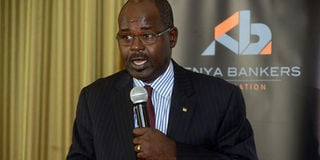Premium
Pyramid schemes take advantage of weak laws to con Kenyans

Kenya Bankers Association CEO Habil Olaka. Banks have defended their role in busting fraud. SALATON NJAU | NATION
Peter Walemba Isaya was a police officer in Vihiga in 2005 when he and his wife Julia Adhiambo Makokha set up Jujuma Enterprises Ltd, a pyramid scheme they used to con another police officer, Alfonse Shisiebo, of Sh200,000.
Mr Shisiebo expected to get Sh40,000 in monthly dividends from Jujuma Enterprises but received only one instalment before the company folded.
He reported the matter to his employer.
Mr Isaya and his wife were eventually arraigned for fraud.
It appeared that justice had been served when in 2010 Mr Isaya was found guilty of fraud.
'LAW BREACHED'
Mr Isaya appealed the decision at the High Court, arguing that section 200 (3) of the Criminal Procedure Code had been breached.
The section states that when a new magistrate takes over an ongoing trial, the accused has a right to demand that witnesses give their testimony afresh.
Mr Isaya proceeded to the Court of Appeal when the High Court dismissed his case.
In 2015, the appellate court said prosecutors did not prove the case against him beyond reasonable doubt.
One of the sticking points was that Mr Shisiebo had said Sh200,000 was the amount withdrawn from his account and given to Mr Isaya.
FREE MAN
In her testimony, Mr Shisiebo’s wife said the couple withdrew Sh207,000 but gave Mr Isaya Sh200,000.
And just like that, Mr Isaya walked away a free man. Had he lost the case, he would have been fined Sh50,000.
The Nation has not been able to trace other convictions related to pyramid schemes.
Our reporters found only two successful cases in the civil courts — one against Spell Investments where 388 investors are to get an Sh82 million refund, and another in which Sasanet Investments was ordered to pay a couple Sh5.6 million.
Church leaders, politicians and businesspeople have over the years been accused of endorsing companies that later sank with investors’ money in dubious agreements.
Legally, there is nothing to hold them on.
Lawmakers are yet to come up with stringent laws to address the changing nature of pyramid schemes.
Banks have defended their role in busting such fraud, arguing that they can only do so much after adhering to the know-your-customer rules prescribed by the Proceeds of Crime and Anti-Money Laundering Act, read alongside the guidelines set by the Central Bank of Kenya (CBK).
The KYC checklist confirms the nature of business a company or an individual is doing and details of the owners.
Lenders use that information to ensure that suspicious transactions are reported to the CBK.
“If, for instance, a company says it deals in oil and receives money in its account that is not linked to the business, the bank will report that to CBK. If the bank has met the KYC requirements, we cannot say the bar has been set low for the KYC checklist or that banks are not properly implementing the KYC,” Kenya Bankers Association chief executive Habil Olaka told the Nation by phone.
NO REPLY
By last evening, CBK had not responded to queries on whether there are measures in place to tighten the KYC checklist.
Dozens of fraudsters are still enjoying the fruits of pyramid schemes they used to steal from hopeful investors.
New companies pop up every so often and swindle billions of shillings from Kenyans.
Gaps in laws have made it difficult for authorities to catch up with fraudsters or for regulators to smoke out perpetrators of pyramid schemes before they make away with their loot.
Contacted for comment, Director of Criminal Investigations George Kinoti told the Nation that he is out of the country but would respond when he returns.
MP'S PROPOSAL
Lawmakers have also avoided the fraudsters’ paradise of pyramid schemes.
In 2012, a proposal by Ikolomani MP Boni Khalwale failed to get to the debate stage because the National Assembly was dissolved to pave the way for the 2013 General Election.
Since then, no MP has taken up the fight against the schemes.
In 2014, the National Assembly’s Implementation Committee threatened to sanction Cabinet secretaries who failed to act on the recommendations by the 2009 Task Force on Pyramid Schemes.
There has been no action by Parliament on pyramid schemes or their victims since 2014.







